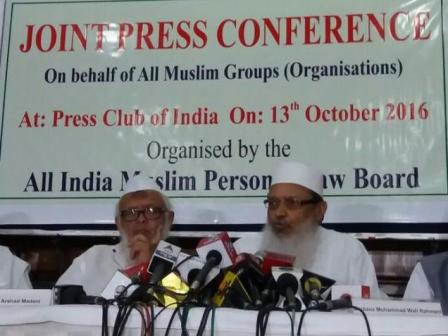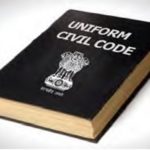CCV’s Isaac Gomes gives his views on Chhotebhai’s article “Unity or Uniformity” on Uniform Civil Code (UCC)

Cover photo: Jamiat-Ulema-e-Hind president Maulana Arshad Madani (left) and All India Muslim Personal Law Board general secretary Wali Rehmani address a press meet in New Delhi on Thursday. Photo: Shiv Kumar Pushpakar, the Hindu.
 The Preamble to the Constitution states that India is a “secular democratic republic”. This means that there is no State religion. A secular State shall not discriminate against anyone on the ground of religion. A State is only concerned with the relation between human beings. This does not mean one cannot practise one’s religion – it only means that religion should not interfere with the life of an individual.
The Preamble to the Constitution states that India is a “secular democratic republic”. This means that there is no State religion. A secular State shall not discriminate against anyone on the ground of religion. A State is only concerned with the relation between human beings. This does not mean one cannot practise one’s religion – it only means that religion should not interfere with the life of an individual.
India has multiple family laws. The Christians have their Christians Marriage Act 1872, the Indian Divorce Act, 1869 and the Indian Succession Act, 1925. The Parsis have Parsi Marriage and Divorce Act, 1936, and their own separate law of inheritance. Muslims have their own personal laws. Hindus law has by and large been secularized and modernized by statutory enactments.
In India the law is communal insofar as each community or religious group has its own distinct law to govern domestic relations. It is also personal as each person carries one’s own law wherever one goes in India.
Supreme Court had asked the government in October 2015 why it hadn’t attempted to bring the UCC when it had the mandate. The apex court had said, “There is total confusion… We should work on the Uniform Civil Code. What happened to it? If you (government) want to do it, then you should do it. Why don’t you frame and implement it.”
It also said,“This cannot be accepted, otherwise every religion will say it has a right to decide various issues as a matter of its personal law. We don’t agree with this at all. It has to be done through a decree of a court.”
To abide by the strictures of the Supreme Court of India and to do away with the discriminations / anomalies in the personal laws of different religious communities, a need has arisen, more than ever before, to enact a Uniform Civil Code (UCC) by inviting citizens to give their input.
The Law Commission on Friday 7th October 2016 sought public opinion and appealed to members of religious, minority and social groups, non-government organisations, political parties and government agencies, to present their views through a questionnaire on a range of issues, including the practice of triple talaq and the right to property for a woman citizen. The Law Commission was asked by the Union Law Ministry to examine all issues pertaining to the Uniform Civil Code (UCC) which is necessary for a secular India so that the same laws are valid for every citizen without taking religion into consideration.
“The objective behind this endeavour is to address discrimination against vulnerable groups and harmonise the various cultural practices. The Commission invites suggestions on all possible models and templates of a common civil code,” said the Commission in its appeal. The responses can be sent within 45 days, either through post or email.
In its questionnaire, the Commission has sought public opinion on issues like these: whether the UCC should include all of some of the subjects, including marriage, divorce, adoption, guardianship and child custody, maintenance, successions and inheritance; whether the existing personal laws and customary practices need codification; whether codification can ensure gender equality; and whether the UCC should be optional.
Views on issues pertaining to the denial of maintenance or insufficient maintenance, compulsory registration of marriages, protection of couples who enter into inter-religion and inter-caste marriages, and the legal validity of the UCC vis-à-vis the individual right to freedom of religion, have been asked.
Responses on whether polygamy, polyandry and other customary practices like ‘ maitri-karaar ’ (friendship deed) should be banned or regulated, and whether the practice of triple talaq should be abolished in toto, retained, or retained with suitable amendments, have also been invited.
Besides, the Commission has asked if steps need to be taken to ensure that Hindu women are better able to exercise their right to property, which is often bequeathed to sons under customary practices; whether the two-year waiting period for finalising divorce violates Christian women’s right to equality; and whether all religious denominations should have common grounds for divorce.
If UCC is enacted, all personal laws on marriage, divorce and property rights in the country would be replaced by one set of laws applicable to all communities of our country, irrespective of one’s religion.
All developed and most of the developing countries of the world have one set of civil laws applicable to all citizens irrespective of religion, caste, colour and creed. In fact in countries like the UK, USA, France and Germany in spite of a high Christian population, uniform civil law is applied to all citizens in matters of marriage, separation, maintenance, divorce and inheritance. Religion is totally treated “Personal” and has no official role to play in matters of civil rights and liberties. Are the Muslims, Hindus, Sikhs or Buddhists in these countries raising any uproar demanding separate laws based on their religion? The answer is no. They are obediently abiding by the State Laws. Taking a cue from the developed countries, many Muslim countries have adopted uniform civil code and everyone has to abide by it without crying “minority”.
UCC should be introduced based on the premises “One Country One Law” as is observed in all developed and most developing countries. Having separate sets of laws for separate religious/ cultural groups in the same country simply creates chaos and gives licence to the respective religious heads to control their flock by divide and rule policy. If most of the world’s countries can have UCC, why can’t India for greater Common Good, especially when it is a secular country?
Passport Seva portal stipulates that for applicants born on or after 26.01.89, only Birth Certificate issued by the Municipal Authority or any office authorized to issue Birth and Death Certificate by the Registrar of Births and Deaths is acceptable. On whether for Christians, Muslims and Parsis, marriage certificate issued by Qazi/Church will be accepted as a valid proof of marriage, the answer is only an attested copy of marriage certificate issued by Registrar of Marriage would be accepted. If one has marriage certificate issued by Qazi/Church, then one has to meet Assistant Passport Officer (APO) at the nearest Passport Seva Kendra (PSK).
Many of my friends when they wanted to take their wives abroad were asked to produce Civil Marriage Certificates – the Church Marriage Certificate was not accepted. They had to go to Marriage Registrars for Civil Marriage. Even for Divorces (Decree of Nullity), the pronouncement by the Judicial Vicar of Ecclesiastical Court has no value in a court of law.
The provision for an equitable and non-discriminatory Uniform Civil Code is enshrined in Article 44 of the Constitution. Fali S. Nariman, constitutional jurist and senior advocate, says: “Article 44 provides that the state shall endeavour to secure to citizens a Uniform Civil Code throughout the territory of India.” So it is encumbent on the Government in power, not necessarily NDA. Even the UPA-I and UPA-II government led by Manmohan Singh could have done it but it did not. The Article is based on the concept that there is no necessary connection between religion and personal law in a civilized society. Marriage, succession and like matters are of secular nature and, therefore, law can regulate them without religious interference.
The secular activities, such as inheritance in personal laws should be separated from religion. A uniform law would be applicable to all irrespective of religion, caste and creed. Sceptics said that firstly, Uniform Civil Code (UCC) would infringe on the fundamental right of freedom of religion as mentioned in Article 25 and secondly, it would tantamount to tyranny of the minority. The first objection is misconceived because secular activities associated with religious practice are exempted from this guarantee and since personal laws pertain to secular activities (marriage, separation, divorce, inheritance, etc.) they fall within the regulatory power of the state. Regarding the second point, nowhere in advanced Muslim countries viz.Turkey, Egypt, Malaysia and Indonesia there is a separate set of laws for Hindu, Sikh, Buddhist or Christian minority communities. So it is pointless to give a BJP or RSS colour to India’s push for UCC. As mentioned before, even the UPA-I and II Governments could have pushed for UCC but avoided it like a hot potato.
For women who constitute almost half the population of India, the UCC will provide equality and justice in courts of law in matters of marriage, divorce, maintenance, custody of children, inheritance rights, adoption etc. irrespective of their religion. Most women activists are in favour of UCC as they foresee much more transparency in it and more uniform benefits flowing than they have been getting under their personal laws.
Subhash C. Kashyap, constitutional expert and honorary professor at the Centre for Policy Research, a Delhi-based think tank, said “The advantage of having a Uniform Civil Code is that every citizen would have to adhere to only one law. It would bring equality before law and, more importantly, equal protection before law.”
In all modern countries there is only one common law for everybody. In India there is only one common criminal law (IPC and Cr PC) for everybody. For instance Muslim law provides stoning to death for a woman who commits adultery, but stoning would be illegal under IPC. A Muslim husband can divorce his wife by saying “Talaq Talaq Talaq” without ascribing any reason, whereas a Muslim wife cannot do so. She has to file a petition in court which takes years to decide and she must make out a ground (adultery, cruelty, etc.).
A Muslim man can marry four wives but a Muslim woman can at a time, have only one husband. Monogamy represents equality between man and woman and this is the age of equality and Women Empowerment. So why should polygamy be permitted to Muslim men under Muslim Personal Law? Up to 1955 a Hindu man could have unlimited wives. This law has been altered by Hindu Marriage Act 1955 which allows only monogamy.
The Supreme Court of India for the first time, directed the Parliament to frame a UCC in 1985 in the case of Mohammad Ahmed Khan v. Shah Bano Begum, popularly known as the Shah Bano case, In this case, the penniless Shah Bano Begum claimed maintenance from her husband under Section 125 of the Code of Criminal Procedure after she was given triple talaq by him. The Supreme Court held that Shah Bano had a right to get maintenance from her husband under Section 125. The Court also held that Article 44 of the Constitution has remained a dead letter. The then Chief Justice of India Y. V. Chandrachud observed that, “A common civil code will help the cause of national integration by removing disparate loyalties to law which have conflicting ideologies.”
Thus, the apex court has on several instances including October 2015 reminder, directed the government of realize the Directive Principle enshrined in our Constitution.
The whole debate can be summed up by Justice R.M. Sahai’s judgment. He said: “Ours is a secular democratic republic. Freedom of religion is the core of our culture. Even the slightest of deviation shakes the social fibre. But religious practices, violative of human rights and dignity and sacerdotal suffocation of essentially civil and material freedom are not autonomy but oppression. Therefore, a unified code is imperative, both for protection of the oppressed and for promotion of national unity and solidarity.”
It is the high time that India had a uniform civil law which would incorporate the most modern and progressive aspects of all existing personal laws and discard those that are retrograde.
 It must be mentioned here that the Union Law Ministry by having floated a questionnaire and asking for citizens' feedback within 45 days, has at least invited public participation – whether 45 days' time is enough or short is of course a matter of debate. Normally the Government extends the deadline, as it did in the case of Draft National Education Policy.
It must be mentioned here that the Union Law Ministry by having floated a questionnaire and asking for citizens' feedback within 45 days, has at least invited public participation – whether 45 days' time is enough or short is of course a matter of debate. Normally the Government extends the deadline, as it did in the case of Draft National Education Policy.
Also one might agree or disagree with the Government's approach or the Questionnaire. But this can be done in a decent manner to the extent that one might agree to disagree. But the way All India Muslim Personal Law Board (AIMPLB) has rejected the proposal outright and openly challenged the government by claiming to be the spokesperson of all Muslims in India (this has been challenged by other Muslim bodies and women's groups), needs to be carefully studied. For no Minority Group in a Muslim country would be allowed to be so brash as the AIMPLB has been on national channel by even accusing the government of waging a "war" against the community. It is thus an open affront to the Government of the day. It would be an interesting at the same time testing exercise for the government to find out who is funding this "war". “People of different cultures stay in this country, if the UCC is implemented, attempts will be made to paint all in one colour, which is not in the interest of the country. Also, We don't want the practice of triple talaq to be abolished. There are more divorces in other communities. Rather the highest rate, which is double that of Muslims, is among Hindus," claimed Mr Wali Rahmani, General Secretary.
Don't people of "different cultures" stay in the Australia, UK, USA, Canada, France and Germany abiding by the UCC? Have they been all "painted in one colour" for following UCC? Can AIMPLB go to these countries and raise a furore demanding separate personal laws for Muslims? Similarly can VHP or RSS or Sikh leaders agitate for separate rights / laws for their own communities in those countries? No way! To the opportunists and fence-sitters, India is still a land of milk and honey!!

















From: John Dayal
Sent: Sunday, October 16, 2016 2:20 PM
To: isaac gomes
Subject: Re: UNIFORM CIVIL CODE
Have often wondered what would be the status of the LGBT community and Section 377 in a uniform civil code, whether Hindus would lose the tax benefits of the HUF system.
The government needs to unfold its own concept. It refuses to.
Btw, Hindu marriages are valid across the globe and Pandits are in great demand among NRIs.
God bless
John Dayal